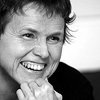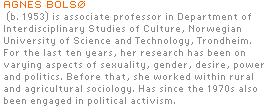| 
|  |  | 
|  |  | 
|  |  | There seems to be a consensus among Norwegian gays and lesbians that we have to reorient gay politics once judicial issues cease to top the list of challenges. Queer is one, but not the only perspective that would enable a political critique and constructive reorientation. The ideas that “queer theory” comprises are part of a larger critical move within the humanities and social sciences since the 1980s and before. However, queer stands out as the alternative in the Norwegian debate because of the way the political debate took queer critique as a pivotal point of departure. Obviously, queer itself is by no means devoid of challenges.[1] Having said that, no Western gay and lesbian political movement could avoid the influence of queer as it washed over us nearly two decades ago. However, the top people in the Norwegian movement generally reject it. In this text I will use the sometimes heated debate about queer to shed light on their resistance as well as the ideas that this resistance is based on. |  | 
| 
|  |  | 
Queer demonstrated new possibilities for rethinking sexual politics, but perhaps more importantly, queer ideas also exposed and made explicit how gender and sexuality were understood in a particular cultural, social and national context. Queer was resisted, embraced and reworked in locally very specific ways, and it was certainly impossible not to relate to queer if you were interested in ideas about gender and sexuality. This is also the reason why queer remains an important influence. Like it or not, queer theory has, somehow, to be negotiated and incorporated into the local understanding of sexual politics.[2] |  | 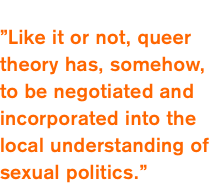
| 
|  |  | Politically, we sometimes find queer realised as a late modern form of anarchism. In Trondheim and Oslo, as well as in London, Madrid and Berlin, young people calling themselves queer may variously squat houses, oppose capitalism, corporate globalism, and any other hierarchy, or promote vegetarianism while rejecting the notion of gender altogether. Some would say that queer theory is compatible with anarchism in every way. I of course welcome this critical engagement with sexuality and gender, even if I have never gravitated towards anarchism myself, be it of modern or late modern forms. We have in Norway also the organisation “Queer Youth” (Skeiv Ungdom), challenging their mother organisation: The National Association for Gay and Lesbian Liberation (The Association, for short). I do not agree with everything that is in Queer Youth's platform, for instance that they want “gender taken out of the laws, [because] everyone should be equal before the law” (political platform agreed upon in 2006).[3] Furthermore, they oppose quotas for equal representation of women and men, since we cannot know what gender people may feel is applicable to them.[4] That position strikes me as too much of a celebration of both liberalism and deconstruction. Having said that, I am indeed very sympathetic to the alternative that Queer Youth is trying to develop in the shadow of the more prominent gay and lesbian political agents and their established ideas of gay politics. This article might explain some of the reasons for wanting to develop an alternative and also why it is difficult to be heard. There is an almost basic resistance to queer theory among those who do gay and lesbian politics on a national level. This has been as outspoken and evident in the gay press as in the left press and also at the national meetings of the gay and lesbian association. The equivalent to the term “gay and lesbian” in Norwegian is “homofile og lesbiske”, “homophiles and lesbians”. To maintain the term “homophile” has been essential for homo-positive politicians, gay and straight, for political reasons. Being “homo” is not mainly about sex, it is argued, but about philia, friendship and love. This has made queer theory's focus on the unruly nature of sexual desire problematic, too bound up with sex, with the flesh and its psychic compulsions. It is seen as particularly harmful in times in which the battles for church marriage, insemination and adoption rights have made it crucial for gays and lesbians to come across as fit parents. This partly explains the resistance to queer, but cannot account for all of it. |  | 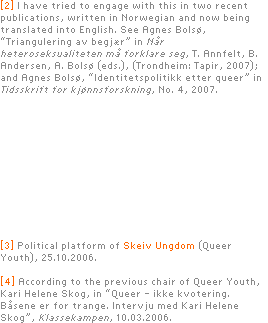
| 
|  |  | 
Compared to most other countries, it is easier in Norway to imagine that new ideas about gender and sexuality could become state policy. One might say that queer as state policy is a contradiction in terms, and I would not disagree with that. The nature of queer - if one can talk about the nature of a stream of thought, or pin down the nature of anything, for that matter - is always to be critical, always to resist, always to question. It therefore follows that it is quite simply not in the nature of queer to be carried out by public officials. On the other hand, that could be true for anything that seriously criticises present order, such as for instance socialist ideas. But a socialist party can in fact make a difference in a capitalist country, as again we see it for instance in Norway. In both cases - the socialist and the queer - the goal could be seen as walking towards the horizon, “... you'll never reach it, but it keeps you going”, as the filmmaker Rodrigo Vazquez has said about the promise of revolution.[5] |  | 
| 
|  |  | Nevertheless, as I have said, we have not in Norway seen much political implementation as a result of queer critique. Quite to the contrary, each and every established voice in gay politics on a national level rejects queer theory wholesale. I am still wondering why, having already mentioned that the queer focus on desire does not fit very well with today's political agenda, geared more towards family matters as it is. But queer's revelling in desire cannot be the whole explanation. There have been very heated debates, especially in front of national meetings of The Association. Many activists, especially among the young, want to discuss and see more of queer theory's ideas on identity, on power, on normativity tried out in practice. This leads to the question: do we have a gay establishment who sees its privileges undermined or threatened by the possible implementation of some of the basic ideas of queer theory? This is what I will argue here. The political agents, who will here be mentioned by their names, all hold quite ordinary, middle-class positions in Norwegian politics, bureaucracy and research (positions that are obviously similar to the one held by this author). My main focus will be ideas about gender and sexuality that these political agents seem to share. These are ideas that keep a quite specific form of gay politics going, with its particular effects on the public image of “the homophile”. I will emphasise that I am not talking about an elite in an economic or in any glamorous sense. Nor is the Norwegian elite a parallel to the American gay right elite which subscribes to economic liberalism and individual freedom and at the same time opposes collective action, solidarity and critique of capitalism.[6] On the contrary: in the present study the gay elite is on the political left. |  | 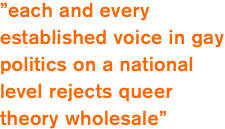
| 
| 
|  |  | 
My first incentive to write about gay elitism came about in April 2007. An interview with two prominent gay politicians in the only Norwegian gay and lesbian magazine, Blikk, set me off writing a rather passionate letter to the editor on the rethinking of anti-discriminatory sexual politics.[7] The present Norwegian government is a coalition of the social democrats, the socialists and a centre party, the latter attracting its main constituency in the rural areas. The ones interviewed in the article in Blikk were Håkon Haugli, a social democrat and leader of a group within the social democratic party advising their politicians on gay and lesbian politics, and Gro Lindstad, a socialist working in Parliament, giving advice to the socialist party's elected representatives in fields like foreign politics, politics of defence and on matters concerning refugees. Lindstad is also the deputy of the Oslo branch of her party and a former chair of The Association. When these two commented on The Association's political agenda, as they did in Blikk in April 2007, it was not just anybody talking, but someone with good credentials at the very top level of Norwegian politics. In the interview Haugli says: |  | 


| 
|  |  | We are standing at an important crossroad. The possibility of full equality is within reach in the very near future. What will happen to us then, when we no longer have a major issue to fight for? I'm worried we'll have an identity crisis, despite all the issues that are still lined up, begging to be solved.[8] |  | 
| 
|  |  | When Haugli says that full equality is within reach, he is thinking of the gender-neutral marital law that will probably become reality in the spring of 2008, a law granting gays and lesbians adoption rights, the right to reproductive assistance, the same rights as heterosexual couples concerning inheritance and taxes, and most likely, as a consequence of this, quite a few of the pastors in the state Lutheran church will start performing ceremonies for gay and lesbian couples. At present, a new marital law is the major issue, and something of a jewel in the crown of gay rights politics which in recent years has become quite family-oriented.[9] Haugli rightly foresees a new situation coming up after equality is obtained in the legal sense. The issues he and Lindstad mention in the interview, after equality before the law, are mainly twofold. Firstly, there is the broader question of conditions for gays around the world who do not enjoy the same rights as we do. And on the home front, which after all has to be the basis for The Association's politics, there is the question of the health of Norwegian homosexuals who at the moment, it seems, drink too much alcohol, use too many drugs and, especially among the young, have higher attempted suicide rates than others. So the statistics say, and they had better be right, because statistics on suicide, health and drugs are the main field for the government's investment in research on homosexuality. I will return to this. What triggered my concern in the interview was that Haugli and Lindstad do not, as one might have expected when one sees a crisis coming, say that we will have to rethink our agenda, our strategy or how to understand political work in this new situation. I would have expected this, especially as they also stress in the same interview how important it is to think through a long-term perspective. But no, the medicine was identical to what we have been prescribed up till now, namely to intensify the work of pressure on politicians and especially on politicians in Parliament in the capital of Oslo. Lindstad spells out what is required of The Association: |  | 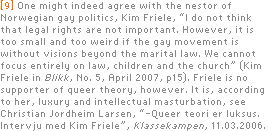
| 
|  |  | Activity towards the Parliament [...] to be a resource, to contact politicians often, give input. After a while, politicians in Parliament will themselves start calling, to get the competence of The Association… It's all about some weekly phone calls around, to hear what's going on… Now we hear little or nothing.[10] |  | 
| 
|  |  | This really puzzled me, and it also made me annoyed because for the last 20 years, debates on sexual politics have been going on in Norway and elsewhere, influenced by poststructuralism and queer theory, that might have something to offer, and not least when one has, as we saw Haugli state, an identity crisis. This must not even be contemplated. According to Lindstad, future perspectives may not: [...] be reduced to academic debates about queer theory and the like which sidetrack gay politics. That would be of no help to the young and doubtful homophile in Suldal [a typical name for a rural village] or homophiles having stones thrown at them in Tallinn because they try to march in a gay parade.[11] |  | 
| 
|  |  | So there you are, queer perspectives are not seen as relevant for rethinking gay politics in a country where even the gay and lesbian socialist politicians admit that there is little more to achieve in jurisdiction. In my reply in Blikk I ended by saying that it is almost unbelievable that gay and lesbian advisers should actively dismiss queer theory. How could that be, since many people, especially the young, are interested in it, and surely the issue could be at least discussed? Are they perhaps protecting their own identity and continuing importance as gay politicians of a particular stature? Is this rejection, I wondered, not so much about the potential of new ideas to fight against homonegativity and homophobia, but about the queer potential of questioning elitist gay positions, positions that might be seen as needing to rely upon the idea of an open discrimination against the homophiles?[12] |  | 
| 
|  |  | 
One important event before the debate in Blikk was the conference “Homo Politics meets gender research and vice versa” (Homopolitikken møter kjønnsforskningen og omvendt), organised in the autumn of 2005 by the state-funded Information Centre for Gender Research in Norway (KILDEN), on assignment from the gender research programme in The Research Council of Norway. Thus, the conference had a certain status. Among other contributors, the social democratic State Secretary, Kjell Erik Øie, was invited to speak for 45 minutes, and I was invited to give a 20-minute comment. Øie is a former chair of The Association (1987-1991) and a successful central lobbyist for the right to domestic partnership for gays and lesbians, achieved in 1993. He is perhaps the most prominent gay politician in the Norwegian public. Over the years, I have noticed and appreciated his work. I received his talk a couple of days before the conference, and it turned out to be a Power Point bullet presentation, beginning with the opening bullet points where he presents himself under the title, “Who am I” (my translation): |  | | 
|  |  | 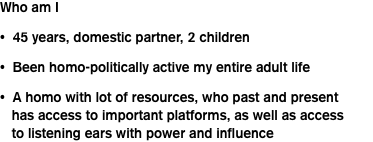
|  | | 
|  |  | This was enough material already for my own 20 minutes. In my comment I made an interpretation of these bullet points, trying to draw a fuller picture of the person here briefly sketched. I would see him as a family man, with his paperwork completed, responsible, tied to past, present and future through his work and family life, with responsibility for the next generation. He is a person to trust, he has steadily been doing good political work all his life. He might have made sacrifices, but never gave up, and will not now. He has power, meets with powerful people, formally and informally. I made the point that we had come a long way when an openly gay person, in national politics, could present himself in this way in public. I also, in a friendly and joking way, I thought, pointed out that except from the homosexuality, this person seems to be extremely well-adjusted and established, his life itself connecting to the main issues of the gay movement and gay politicians in Norway in recent years: domestic partnership and now the gender-neutral marital law. Perhaps then, I asked, was it not just in spite of homosexuality, but also because of homosexuality as a cause that it had it been possible for him to become this sturdy representative of social order? My point in presenting this is that he did not seem to find any of it interesting or challenging - and certainly not at all amusing. With my knowledge about political and academic subculture on the “leftish” side of politics, I was sure that Øie and I would exchange some thoughts about his talk and mine when we were done presenting, especially in this case, since both were plenary talks without comments from the floor or any debate. I was, however, both surprised and disappointed that he just passed me on the way out of the conference hall, head high, saying with obvious contempt, aloud to no one in particular, “I ought to have seen this coming”. It might be that I had been too provocative, despite my self-perception as friendly and well intentioned, but to me this nevertheless later came to represent a quite intense dismissal of my take on the question of power. (I should add that my talk was otherwise very well-received, by other scholars as well as activists). For him, so it seemed to me, homosexuality was to be seen only as oppressed in society, and it was inappropriate to suggest that in certain cultural contexts, gayness might also provide for a good middle-class life, based on a democratic society's consciousness and guilt as oppressor. I began to think that within the established homo-political frame of reference, it seems crucial to keep alive and vital the image of the oppressed homophile, and not only on the political arena. In his talk about research and gay politics, Øie would point in particular to the quantitative studies of (the poor) health and quality of life among the homophiles and lesbians. |  | 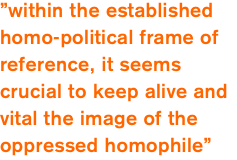
| 
|  |  | 
Most Norwegian research in the social sciences and humanities is funded by The Research Council of Norway. However, the ministry for which Kjell Erik Øie is a State Secretary, The Ministry for Children and Equality, provides money for gender and sexuality research via The Research Council, or to particular projects. One would hope that the programme for the ministry's big conference “Trygghet og mangfold” (Safety and Diversity) in September 2007 is not indicative of where such money will go in the near future.[13] The conference was held to establish the foundation for a future state policy for gays and lesbians. Kjell Erik Øie and the minister he then served, Karita Bekkemellem, had the last and the first words respectively.[14] The conference raised the same question as we saw Haugli and Lindstad do in Blikk in April 2007: what now, when the law is in place? And who were the keynote researchers whom the State Secretary and the minister had found to help them shed light on this challenge? They were three, and all talked about physical health, mental health, living conditions and quality of life among sexual minorities, based on large survey data. What answer to the “what now?” question is thus left imaginable other than a focus on the health of the homosexual? There was one Norwegian researcher among the three, the quantitative sociologist Bera Ulstein Moseng from the research institute NOVA (Norsk institutt for forskning på oppvekst, velferd og aldring). I will take a brief look at what she has been saying about homosexuals during the better part of the previous decade. |  | 

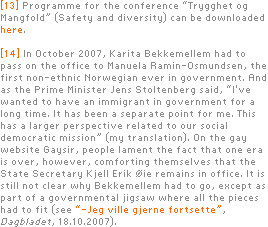
| 
|  |  | In 1999, Moseng was the public figure in the forefront of the project mapping the health and life situation in a sample of the Norwegian gay and lesbian population. It revealed increased use of drugs and alcohol compared to the rest of the population and alarmingly, 25% of the youngest had at least once tried to commit suicide.[15] This was the backdrop of the white paper on gay and lesbian welfare, where the outset for the government was “respect for homophiles and acceptance of the homophile life”, stating, unreflectingly, the fundamental difference between “them” and “us”.[16] Moseng collaborates closely with the ministries as well as with The Norwegian Confederation of Trade Unions (LO). In the national budget for 2008, presented in October 2007, we can, if the Norwegian gay website Gaysir is correct, read that the government will fund with the amount of 2.8 million Norwegian kroner a project that for the second time in less than 10 years maps the health and life situation of gays and lesbians.[17] This is a sequel to the project that established Moseng as the one with competence on gay health (and miseries) in 1999, a project that is also on the priority list for The Association (2006-2008). As will become clear from the following, I will recommend that the government carefully thinks through the theoretical foundation of the new project. |  | 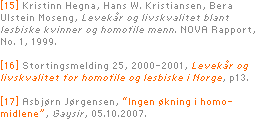
| 
|  |  | Moseng was a co-writer of the article “Sorry, we don't speak queer” which was, as I see it, a shallow presentation and critique of queer theory.[18] And what is Moseng's own message? If you have a stable sexual identity as a homophile, out and proud, you are likely to live a good life, in some ways better than the heterophiles (better economically, more cultural interests, more important friendships). However, if you have, as a homophile, once in your life slept with a person of the opposite gender, you are more likely to abuse drugs, but not only that, you are more likely to have all sorts of somatic and psychic sufferings. She summarises her results like this: |  | 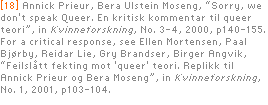
| 
|  |  | A main finding in this drug study is […] that an unambiguous sexual deviance is considerably easier to live with than semi-conformity, i.e. meeting the strong expectations still saturating Norwegian society of having a heterosexual career.[19] |  |  | 
|  |  | The bisexual is in a bad situation, but worst off are those who refuse to belong to a firm identity category. They, in addition, are overrepresented among those who have “self-destructive behaviour regarding unsafe sex, and perhaps, therefore also HIV and AIDS”.[20] 60% of the gay men and 80% of the gay women have had heterosexual encounters in their lifetime (and just to make this explicit: now we are talking about a big majority of the gay population). About them Moseng asks: “Has a group among same-sex sexuals [sammekjønnsseksuelle] been localised who needs preventive health care more than the rest of the homosexual population?”[21] She tentatively answers yes, which is to suggest that most homosexuals are probably in need of preventive health care. It might very well be that the statistics suggesting that gays who once had heterosexual encounters drink too much are correct, but a correlation with the heterosexual activity they once engaged in will have to be spurious. Or let me put it like this: there is in Moseng's work no trace of theoretical reflection that would explain and make it in any way likely that there is a relation between previous heterosexual encounters and your health as a gay-identified person. On the contrary, if there were any relation it would have to be that having had heterosexual experiences would function as health protection, since it is the situation as homophile that otherwise makes you ill. I can go on speculating, since Moseng does not operate with theoretical concepts that would allow her to make intelligible interpretation of the numbers. Moseng's work suffers from a general lack of theoretical reflections, critical questions and discussion. I will return to that. |  | 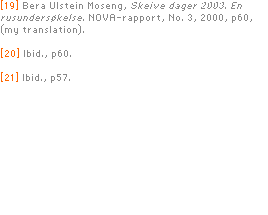
| 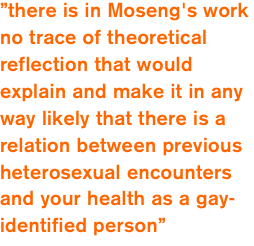
| 
|  |  | Notable is also the fact that in the latest report on violence against homophile and lesbian youth, she leaves out of account 14.6% of her own informants.[22] Why? Because they did not subscribe to a sexual category when they filled in the questionnaire. Even worse, she does not seem to realise that her own data material is no longer representative. She pompously declares that her report on violence is “the first in Norway and the second in the Nordic countries” to be based on representative data. It is also “the very first in a Nordic and European context to study violence against same-sex sexuals in a comprehensive perspective of health and living conditions”.[23] The latter is obviously not true: the use of an analytic perspective whatsoever is just hinted at in an introductory gesture.[24] Neither the media nor public authorities have read the report with a required minimum of critical attention, and Moseng will be able to advocate the health value of a stable and unpolluted homophile identity based on the statistics she produces.[25] Her project on violence was paid for by The Ministry of Justice and the Police. In the report, published in the autumn of 2007, any other research than large-scale, quantitative, putatively representative surveys is labelled “anecdotic knowledge”.[26] She does, however, need the “anecdotic knowledge” for the little there is of discussion in the report, but does not find it necessary to provide the references to the applied works of other researchers. It is impossible to be absolute in one's reference practice, but to systematically omit mentioning these researchers' names and titles of works is an entirely different matter. Moseng is deputy chair in the health committee of The Association. On October 16, 2007, she was answering questions in a web meeting together with Jon Reidar Øyan, the chair of The Association, and Rolf Angeltvedt, the chair of the association's health committee.[27] The topic was harassment of gays and lesbians, with Moseng's research results as point of departure, and the three of them answered questions coming in from people all over the country. André sent a question about masculinity and homophobia: |  | 

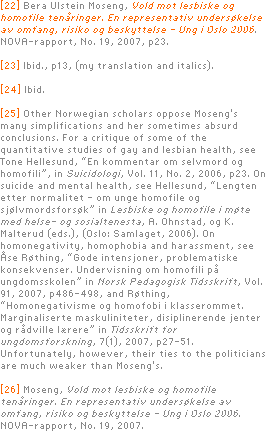
| 
|  |  | Hi! I'm not harassed myself, [...] but I often hear negative comments about more feminine homophiles, so I wonder if sexual harassment of homophiles is supported by “macho culture”, where men are supposed to be “real men”. If so, I think it would be important to fight against such cultures. André [28] The answer given by Bera Moseng is: Hi! There is per today no representative research documenting a correlation between homophobia and macho gender roles. Bera [29] |  | 
| 
|  |  | It might be that what she calls “representative research” is lacking, but I find it hard to believe that she is unaware of the many works of Norwegian colleagues and academics from abroad shedding light on the connection between gendered expectations and the heterosexual norm. Her answer is more than inadequate politically. André is making a very important point.[30] One would wish that the media and the public authorities would begin to relate more also to other forms of research than the works that make up the basis for Moseng's often simplistic and, as we saw here, rather arrogant public statements. |  | 
| 
|  |  | Again and again - in publications with titles such as “Suicidal behaviour among gays and lesbians”, “Suicidal behaviour and sexual orientation”, “The mental health of lesbians”, “Suicidal behaviour among same-sex sexual women and men”, “Gay Pride - a drug survey” and “Violence against lesbians and homophile teenagers” - Moseng establishes and re-establishes the idea of wounded homosexuals in need of great support from society and also as a social minority that is essentially different from the rest of the population.[31] |  | 
| 
|  |  | 
Health issues top the priority list now, as the gender-neutral law of marriage is about to be passed in Parliament. Unfortunately, it seems that the public efforts to stabilise identity and prevent health problems among the homophiles have no age limit - the young homophiles to be protected are these days getting absurdly young. There is hardly any limitation as to how young the homophiles can be before they become the object of preventive efforts from politicians, from researchers, from health workers. Last out is the widely acknowledged psychologist Thore Langfeldt, who, to my knowledge, has not been involved in gay politics directly. He has nevertheless kept an attentive eye on the oppression of homosexuals and been a spokesman for sexual liberation for all.[32] He does not by any definitional means belong to a gay and lesbian elite, but he is part of my analysis because of the ideas he advocates and the way they are circulated in public. Langfeldt is searching for male informants among the gay men visiting Gaysir. Thore Langfeldt's headline reads: How was your homophile childhood?[33] |  | 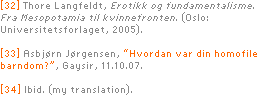
| 
|  |  | 
Health issues top the priority list now, as the gender-neutral law of marriage is about to be passed in Parliament. Unfortunately, it seems that the public efforts to stabilise identity and prevent health problems among the homophiles have no age limit - the young homophiles to be protected are these days getting absurdly young. There is hardly any limitation as to how young the homophiles can be before they become the object of preventive efforts from politicians, from researchers, from health workers. Last out is the widely acknowledged psychologist Thore Langfeldt, who, to my knowledge, has not been involved in gay politics directly. He has nevertheless kept an attentive eye on the oppression of homosexuals and been a spokesman for sexual liberation for all.[32] He does not by any definitional means belong to a gay and lesbian elite, but he is part of my analysis because of the ideas he advocates and the way they are circulated in public. Langfeldt is searching for male informants among the gay men visiting Gaysir. Thore Langfeldt's headline reads: How was your homophile childhood?[33] |  | 
| 
|  |  | He needs informants for the production of an educational film about homophile children, a film to be used in kindergartens and primary schools. He is looking for men who can trace their sexual history back to the age of four. It is important, he says, that teachers, parents and not least the homophile children themselves “are aware that a homophile identity develops from the age of four and that it's quite natural”.[34] The film is financed by The Ministry of Health and Care Services via The Norwegian Directorate for Health and Social Affairs (Helsedirektoratet). The Directorate is an administrative body within, and I quote their website, “certain areas in the fields of health and social affairs and have legal authority within this field. The Directorate contributes to the implementation of national health- and social policies, and serves as an advisory body to central authorities, municipalities, regional health authorities and voluntary organisations”. So they are the ones paying for Langfeldt's project. |  | | 
|  |  | This psychologist is particularly interested in masculine homophile boys, since, as he says, research indicates that they amount to a large, but invisible group. “Many of them live difficult lives, and they are not 'disclosed' the same way as feminine, homophile children”.[35] And it is urgent that these boys get the help Langfeldt believes they are in need of, otherwise they are likely to turn into sexual abusers. |  | 
| 
|  |  | 
On June 12, 2007, one could hear Langfeldt on public radio say that some of the men who are sexually abusive to boys have a “homophile cast of personality” (homofil legning) that they have suppressed since they themselves were boys, indeed since they were 7-8 years old. Society, he said, must help these boys with an early acknowledgement of their “homophile cast of personality”. Langfeldt's message was echoed in the same radio programme by the chair of The Association (Øyan) and also by the State Secretary (Øie), both mentioned above. Langfeldt's project seems in some ways to be similar to Moseng's: to make visible the pitiful homophile individuals and come to their rescue. It is alarming that central agents for gay politics have no critical questions. |  | 

| 
| 
|  |  | From a queer perspective and from some other theoretical starting points as well, we might ask a few.[36] Is not the development of a sexual identity something that takes place during the course of life? Is it not strangely dogmatic and stigmatising to require a conscious confession or claim from 7-year-old boys about their “homophile cast of personality”? Moreover, what is it about this “cast of personality” that might have such catastrophic consequences if undisclosed? Should not every boy, and girl, regardless of the orientation of their sexual desire, be taught by caring adults that there is a potential for the abusive execution of power in sex? Should not every young person learn to reflect upon power in sexual relations and the potential for coerciveness and domination in sex as well as learn something about the shifting character of power itself? Are there aspects of the heterophile cast of personality, oppressed by society, inciting the child to turn into a sexually abusive adult? Or perhaps heterosexuality has no obligation to explain itself in this connection? |  | 
| 
|  |  | 
It is urgent to reorient the politics of a gay establishment whose policy seems to be increasingly irrelevant to the present challenges, if not counter-productive. And it is even more important in a world where the western configurations of sex and gender obviously carry colonial and imperialist values in their complex and sometimes violent meetings with those of other nations and cultures.[37] It does not seem likely that a reorientation of the gay elite will happen any time soon. So far Øie, Øyan, Lindstad, Haugli and Moseng - the bureaucrat, the activist, the politicians and the researcher - all agree to denounce queer perspectives on sexual politics. They probably will not change the way they understand anti-discriminatory politics, anti-homonegativity and anti-homophobia until they have to. The present chair of The Association is in this connection quite interesting as a political agent. Jon Reidar Øyan was all in favour of queer politics before the national gathering of The Association in 2004.[38] He was, however, elected chair on a political platform that was in no substantial way changed towards queer. Since then he has come across as more pragmatic, saying to the newspaper Klassekampen in 2006 that we will have to keep the categories “until we have equal rights”. The gay and lesbian movement must, of course, be pragmatic and take into consideration what one of the veteran gay politicians said to Blikk in 2004: a queer organisation cannot just go and get money from the state. “Money from the state is given out on far different premises!”[39] Correct then, and still is, I am afraid. |  | 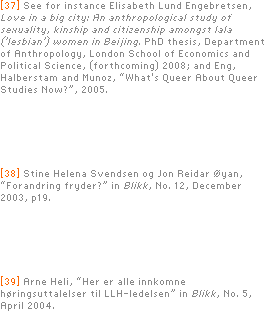
| 
|  |  | However, I am glad to have met with young activists who are finding ways to reorient sexual politics from what it seems to be all about right now, i.e. basically saving homophiles from blurred sexual categories, from drugs, mental sickness and suicide, and in the very same move producing them as pure victims (if one is not so lucky that one is in the safe haven of marriage). Queer enables a critique of contemporary gay politics, but I understand queer as a temporary point of departure while expecting yet another generation of sexual dissidents to come along, seemingly equipped with their own ideas, beyond queer again. |  | | 
|  |  | 
|  |  |
|
